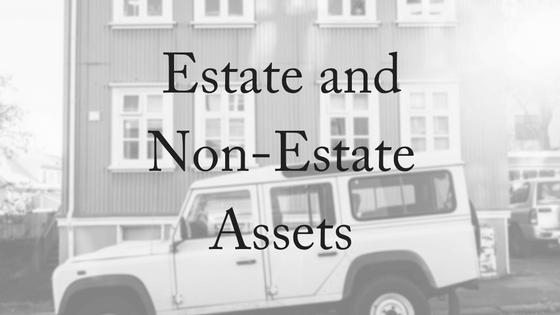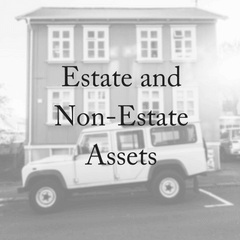![]()

Did you know that there is a difference between estate assets and non-estate assets? A will is a legal document that clearly states how you would like your assets to be distributed when you die. When you die, your property, assets and debts are referred to as your estate. But did you know there are some assets that are not considered part of your estate? Knowing which are estate and non-estate assets will help you to do the best estate planning possible.
Making provision for estate assets and non-estate assets clearly and comprehensively can help your family to avoid any conflict after you’re gone. When emotions are high and instructions are vague it can be a recipe for disaster, which is probably not your intention when you decided to write your will. When you are specific about your assets in your will, you can be quite confident that your property will be given to the people that you intended. It also allows any property that forms part of your estate to be given in the way you want. When you decide what and how is given to specified individuals, there will be less arguing and tension when deciding who gets what. Choosing for your family takes away a lot of stress at a time which is usually quite stressful anyway.
[Tweet “Choosing for your family takes away a lot of stress.”]
What are Estate Assets?
The types of property and assets you can include in a will include things that are personally owned by you – you are the legal owner. Estate assets may include:
Any kind of real property. This might be real estate, land, and buildings, but there are exceptions, listed below.
Cash of any kind. This includes money in cheque accounts, savings accounts, term deposits etc. It also includes any money under the mattress. Again, there are exceptions, listed below.
Intangible personal property. This includes any items of worth that cannot be held. Stocks, bonds, and other forms of business ownership are considered intangible personal property. Any intellectual property, such as royalties, patents, and copyrights, etc., also fall under this category of assets.
Digital assets. Technically these are considered intangible personal property (until any content is printed and then it becomes tangible) but is worth mentioning separately because people often forget that their Facebook, Twitter or Instagram accounts are their personal property.
Unproductive property, which can include such valuable objects like cars, a boat, artwork, jewelry, and furniture, etc. They can be items that are either appreciating or depreciating in value.
It may be that you choose to leave your Grandmother’s diary and pearl earrings to your eldest daughter, your boat to you water-loving son and your golf clubs to your brother who eyed them off  the last time you played golf together. By being specific about who gets what, you not only have the opportunity to reduce the chance for arguments, but also have the opportunity to say another personal goodbye in your choice of assets for different family members. It can be a reflection of how well you loved and knew them and becomes to them a loving communication about your relationship with them, not just property being passed on.
the last time you played golf together. By being specific about who gets what, you not only have the opportunity to reduce the chance for arguments, but also have the opportunity to say another personal goodbye in your choice of assets for different family members. It can be a reflection of how well you loved and knew them and becomes to them a loving communication about your relationship with them, not just property being passed on.
If there are assets that you personally owned before your death but they are not specified in your will then this is called your residuary estate. Some estates have many items that don’t have a particularly valuable worth either financially or sentimentally. If you so desire, you can name someone as a residuary beneficiary and they will inherit the remaining assets that are unspecified and not left to other beneficiaries.
Non-Estate Assets
There are assets that cannot be included in your will. These are referred to as non-estate assets and are things that you do not have legal ownership over or you have joint ownership with another party. These assets are often assumed to be dealt with by a will, but they are not, and this is where good estate planning can save your family a fight.
[Tweet “There are assets that cannot be included in your will.”]
Superannuation may or may not be dealt with as part of your estate. It all depends on whether the benefit is paid to your estate or directly to your beneficiaries. It will only be dealt with as an estate asset via your will if the trustee of the superannuation fund pays the benefit to your your estate. This can happen if your super fund allows you to make a binding death nomination. It must be valid for your superannuation death benefit to be paid in accordance with your nomination. Your nomination may be for the benefit to go to your estate or allow for your superannuation dependents to be nominated as beneficiaries.
 If you do not have a binding death nomination, it is up to the discretion of the trustee as to whether the benefit is paid to you estate or the fund beneficiaries.. The choice of recipient is ultimately up to the superannuation trustee and so your superannuation benefit will be either an estate or non-estate asset, depending on what the trustee decides.
If you do not have a binding death nomination, it is up to the discretion of the trustee as to whether the benefit is paid to you estate or the fund beneficiaries.. The choice of recipient is ultimately up to the superannuation trustee and so your superannuation benefit will be either an estate or non-estate asset, depending on what the trustee decides.
Jointly held property, investments or savings. Jointly owned assets revert to the joint owner on death. It does not form part of the first joint owner’s estate when they die. There are special considerations here for property so seeking professional counsel is a good idea. It may be that joint tenancy is severed and converted to tenants in common. This means that the deceased’s interest in the property can be deemed an estate asset and dealt with by the deceased’s will. The most commonly held joint assets are the family home, and bank accounts.
Property held in trust. Trust assets are not owned by you personally so cannot be dealt with on your will. The trust deed, though, may allow for the control of the trust to be passed on under your will. If the trust owes you, then this is considered an asset of your estate and will be dealt with according to your will.
Life Insurance. A life insurance benefit is normally paid directly to the nominated beneficiary and does not form part of a deceased’s estate.
Taking an inventory of your assets can help to ensure that you don’t accidentally leave any significant property or possessions out of your will. Seeking professional estate planning advice on dealing with estate and non-estate assets will help to ensure that your wishes for your assets will be carried out on your death. The law around wills and estates is complex, and although it is tempting to attempt to make your will on your own, the reality is that specialist legal advice can save you and family thousands of dollars and hours of heartache down the track.
At Estate Battles, our estate lawyers offer a free, 10-minute phone conversation. Why not make up your asset list and contact us today!

